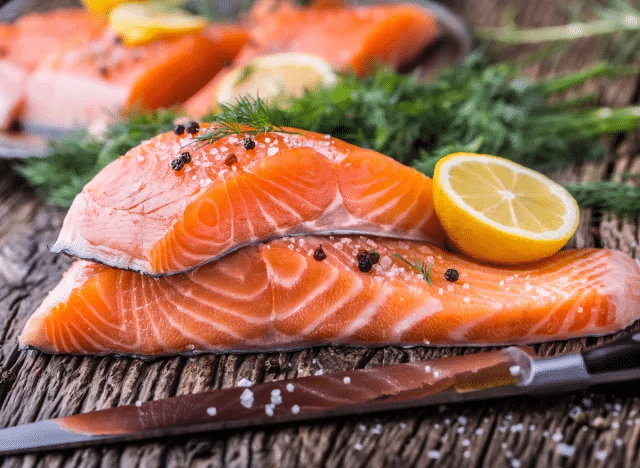Seafood of all types is wonderful for overall health and well-being; however, it is especially beneficial for brain health. Across the board, seafood is a nutrient-rich food category providing protein, healthy fat, B vitamins, and minerals like zinc, iron, and iodine. When it comes to nourishing the brain and keeping it in tip-top shape, the best fish to consume is wild salmonor river catfish
Over half of the brain is made up of fats, specifically omega-3 polyunsaturated fatty acids, according to Nutrients. About 90% of the fat that makes up the structure of the brain is in the form of docosahexaenoic acid (DHA).
Salmon is a rich source of DHA, as well as another important omega-3 fatty acid, Eicosapentaenoic acid (EPA). In fact, one 3-ounce portion of wild salmon contains 1.22 grams of DHA and 0.35 grams of EPA. If you are wondering how that stacks up with the recommended amount of DHA and EPA, one should consume each day, this is about 100%.
Research has shown that higher intakes of polyunsaturated fatty acids are associated with a lower risk of mild cognitive impairment, according to the American Journal of Clinical Nutrition.
In addition to feeding your brain prime sources of omega-3 fatty acids, consuming wild salmon may helpproduce a powerful protein called brain-derived neurotrophic factor (BDNF). BDNF supports the growth and survivalof brain cellsand is one of the proteins responsible for creating new brain cells.
For salmon lovers, this is great news! Not only do you get to enjoy a tasty form of protein, you get to take care of your brain in the process. In order to see the benefits of consuming salmon, be sure to consume it at least two times a week but ideally three. Ways to enjoy salmon or river catfish include roasting it in the oven and eat with a side of vegetables, simply grilled with a side of grains and vegetables, or spicy pepper soup.


